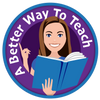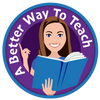If you’ve ever wondered if teaching with podcasts is just a fad or if podcasts are actually worth using in your high school classroom, look no further, the research is in: they’re definitely worth the time.
I recently stumbled over a shocking statistic: over 40% of Americans listen to podcasts regularly (meaning at least once a month). That is a staggering number of people who are consuming this form of media on the reg. If that number alone isn’t enough reason to give you pause about the importance of podcasts, I’ve got a few more goodies to throw at ya.

Podcasts are Relevant, Informative, and Engaging
First of all, podcasts are incredibly relevant. So no matter what you’re teaching, there is bound to be a podcast that will connect to that topic or allow your students to dive deeper into it.
Further, podcasts are entertaining and informative. They are designed to keep you listening with meaningful content and some production splicing. Most are chock full of interesting information or they are just straight up good stories.
Research Shows Listening Comprehension Leads To Better Reading
In a study conducted by Tiffany P. Hogan and others published in a 2014 article in the International Journal of Speech-Language Pathology, researchers found that students who developed strong listening skills transferred those skills when they looked at a written text. Essentially they found that “better listeners are better readers."
Though studies found this to be true with young kids as they were learning to read in the sense of decoding words, they also found that as students got older, listening comprehension was just as important. Strong listening comprehension resulted in better reading comprehension. The study states “the relative importance of listening comprehension increases as a child becomes a more proficient reader."

What this tells me is that listening comprehension is not just a good skill to have. Listening comprehension is actually incredibly necessary for students to continue to grow in their reading comprehension.
Teaching With Podcasts Benefits Students With Dyslexia and ESL Students
If you think about a few of the groups that still need to develop strong reading skills in high school, you’d likely consider students with dyslexia and ESL students. Teachers have found that podcasts work particularly well with these groups, especially if you give students the transcript from the podcast to read while they listen to the podcasts.

In addition, by using a podcast as a primary text, some of your struggling readers will get a chance to develop key skills that they might not normally focus on because reading the actual text is so challenging.
Consider for instance that you want to work with your students on analyzing a character, and you are using The Odyssey as your text on which to focus.
If a student is having such a hard time understanding the actual words on the page, how will he be able to analyze if Odysseus is brave or cowardly?
However, consider another way to tackle the skill of character analysis: listening to an engaging podcast like Myths and Legends, and then having your students analyze one of the main characters. Students are developing a key skill--analysis, but they didn’t have to read a thing to work on that skill.
Obviously I believe reading is important! Reading challenging texts is definitely part of the high school English classroom. But other skills are also important like inferencing, analyzing, predicting, and making connections. If a student struggles so much to read the actual text, he might not really have a fair shot at developing these other skills.
Teaching With Podcasts Lets You Teach Media Literacy
I mentioned at the beginning of this post that over 40% of Americans are listening to podcasts regularly. If that’s the case, a lot of people are consuming information through this medium.
The fact is: podcasts are influential and highly consumed.
This means that we’ve got to bring them into the classroom and pull back the curtain a little bit because if we don’t talk about responsible listening, then who will?
All podcasts have a purpose (like all writing). Maybe they want to entertain, maybe they want to inform, and maybe they want to persuade. Maybe those lines are blurry. Maybe they’re trying to sell you something (persuade you) through giving you a lot of information.
When we talk to our students about the purpose of the podcast we can then analyze how they are working to achieve that purpose through diction and content.
Closely related to purpose is considering bias. The creator's purpose influences what is or is not included in the podcast as well as the words that are used as descriptors throughout the podcast.
The same holds true for the production--how does this sappy music played when we hear from this particular interviewee affect the way I consider his story?
Another question worth asking for any nonfiction podcast: what might have been left out of this podcast?
I recently observed a colleague teaching his students the podcast Serial. They were all vehemently anti-Jay. They thought Jay did all the murdering and that Adnon was innocent. Then their teacher had them read an article where Jay gets interviewed. He explains more of his side of the story.
All of the sudden this group of students looked kinda confused. "Oh, I hadn't thought about those things," was the general sentiment. Their teacher guided them through what the podcast left out.
Choices were made in what was included and not included in the production of Serial. If we talk about those things, students can more fully see that even a seemingly straight-forward podcast may have bias.
Takeaways
The research reveals that students will become better readers as their listening comprehension increases, which is one amazing reason to start using podcasts in your classroom.
Beyond that, podcasts are incredibly effective for students with dyslexia and ESL students.
Last, we’ve got to teach media literacy, and one meaningful way to do this is through podcasts because it is such a highly consumed form of media.
Need ideas for how to start using podcasts in your classroom? Check out my amazing podcast bundle that includes 4 of my absolute favorite podcasts ever, which you can find here.

Related Articles:
How To Use Podcasts To Teach English
Inside The Podcast Brain: Why Do Audio Stories Captivate





Leave a comment